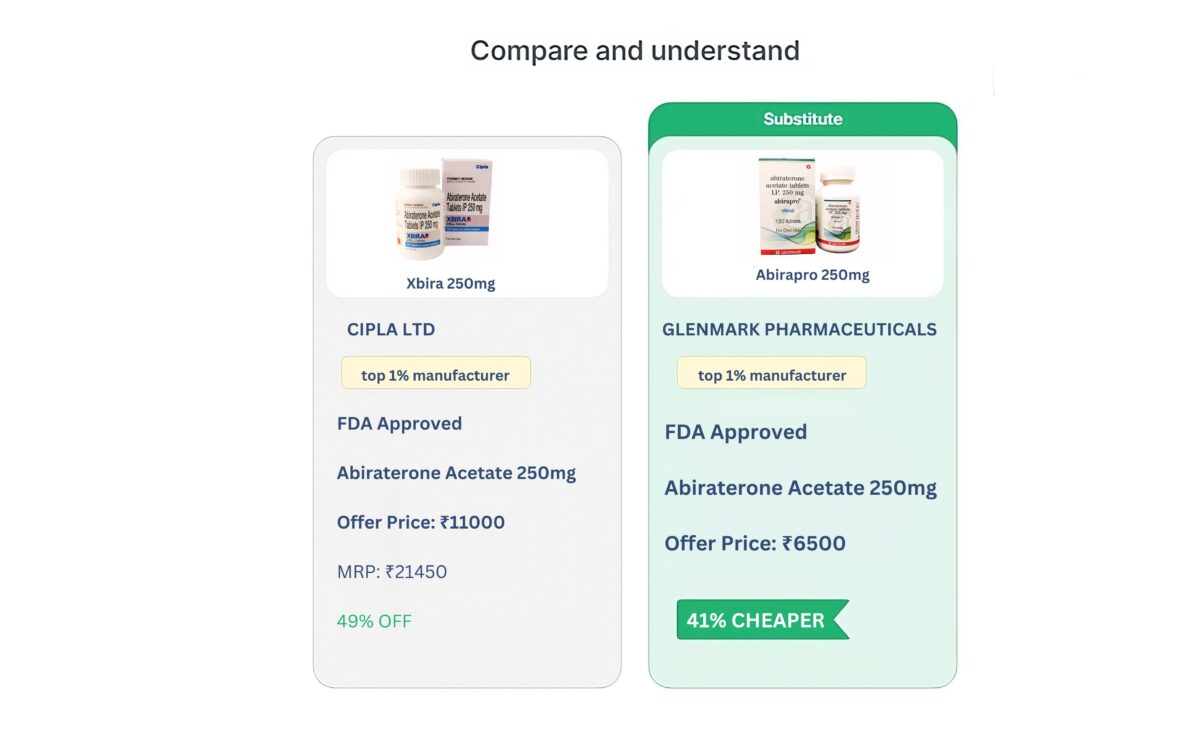Aprepitant
This page provides detailed information about aprepitant, including its indications, dosage and administration, mechanism of action, related brands and strengths, warnings, and common side effects.
Context and Approval Date
The U.S. FDA approved Aprepitant on March 26, 2003, for the prevention of chemotherapy-induced nausea and vomiting.
Mechanism of Action of Aprepitant
Aprepitant capsules work by blocking the action of neurokinin, a natural substance in the brain that triggers nausea and vomiting. This helps reduce the severity of chemotherapy-induced nausea and vomiting.
All Substitutes
View All| Product | Packaging Size | Manufacturer | Price |
|---|---|---|---|
| Aprecap 125mg/80mg capsule | 1 x 3 capsules | Glenmark Pharmaceuticals Ltd | INR 350 |
| Emend 125mg/80mg capsule | 1 x 3 capsules | MSD Pharmaceuticals | INR 800 |
| Emetant 125mg/80mg Capsule | 1 x 3 capsules | Adley Formulations | INR 980 |
| Apretero 125mg/80mg Capsule | 1 x 3 capsules | Hetero Healthcare Ltd | INR 380 |
| Opilo 125mg/80mg Capsule | 1 x 3 capsules | Abbott | INR 850 |
| Apricyt 125mg/80mg Capsule | 1 x 3 capsules | United Biotech Ltd | INR 950 |
Uses of Aprepitant
Aprepitant is used to prevent chemotherapy-induced nausea and vomiting in adults and children aged 12 years and older.
Aprepitant administration guidelines and available dosage options
Swallow the Aprepitant capsule whole with water. Do not crush or chew it. The capsules may be taken with or without food. Avoid exceeding the recommended dose. If prescribed, your doctor will determine the appropriate dosage based on your medical condition, as it varies for each individual. Only discontinue Aprepitant if advised by your doctor.
Information about Aprepitant
Aprepitant uses
Aprepitant is used to prevent chemotherapy-induced nausea and vomiting in adults and children aged 12 years and older.
How aprepitant works
Aprepitant consists of two different doses and works by blocking the action of a chemical messenger in the brain responsible for nausea and vomiting during anticancer treatment.
Common side effects of Aprepitant
Constipation, indigestion, headache, tiredness, loss of appetite, hiccup, increased liver enzymes
Warning, Precautions, and Side Effects Associated with Aprepitant
Warning
Before taking this capsule, inform your doctor if you have any liver disorders, as the liver plays a vital role in breaking down the medication. Your doctor may need to monitor your liver function. Certain medications, including Pimozide, Terfenadine, and Cisapride, may interact with Aprepitant, leading to reduced effectiveness or unwanted side effects. This medicine is not recommended for children under 12 years of age.Precautions
Before beginning treatment, your doctor may assess your liver function. Inform your physician if you have any allergies to Aprepitant. Additionally, if you are pregnant, think you may be pregnant, or are planning to conceive, let your doctor know, as Aprepitant will only be prescribed if absolutely necessary. Consult your doctor for further guidance.Side effects
The most common side effects of Aprepitant include fatigue, increased liver enzyme levels, indigestion, constipation, loss of appetite, hiccups, and headaches. Serious side effects may include allergic reactions such as rash, itching, and difficulty breathing or swallowing.Word Of Advice
Store at room temperature between 20°C and 25°C. Keep out of reach and sight of children. Keep the medication in its original packaging to protect it from moisture. If you miss a dose, do not take a double dose to make up for it. If you accidentally take a double dose, contact your doctor immediately. For any concerns, consult your physician.FAQ - Aprepitant
1 Is it safe to take Aprecap 125mg/80mg Capsule with other medications?
Aprecap 125mg/80mg capsule can be used alongside other antiemetic medications to offer more effective prevention of chemotherapy-induced nausea and vomiting.
2Is Aprecap 125 mg/80mg Capsule used to treat any other conditions?
Aprecap 125mg/80mg Capsule is primarily used to prevent nausea and vomiting caused by chemotherapy or surgery. However, it may also be used to treat other conditions, such as migraine headaches.
3Why should patients with liver conditions avoid taking Aprecap 125mg/80mg Capsule?
Aprecap 125mg/80mg Capsule is metabolized in the liver, so patients with liver disorders may have difficulty processing the medication. This can increase the risk of side effects.
4What information should I provide to my doctor before starting Aprecap 125mg/80mg Capsule?
You should inform your doctor if you have any liver conditions, if you are allergic to Aprecap 125mg/80mg Capsule, or if you are intolerant to sucrose or any other sugars.
5Is Aprecap 125mg/80mg Capsule safe to use during pregnancy?
Aprecap 125mg/80mg Capsule should only be used during pregnancy if the potential benefits outweigh the possible risks to the fetus.
References
1. Ethypharm, Electronic Medicines Compendium (EMC), [Revised on Oct 2022]; [Accessed on 19th April 2023],https://www.medicines.org.uk/emc/files/pil.14650.pdf
2. Merck Sharp & Dohme Corp, US Food and Drug Administration, [Revised date April 2015], [Accessed on 19th April 2023], https://www.accessdata.fda.gov/drugsatfda_docs/label/2015/021549s025lbl.pdf
3. KD Tripathi, Essentials of Medical Pharmacology, Antiemetic, Prokinetic and Digestant Drugs, 7th edition, 2013, 669-670.
4. Goodman & Gilman’s, The Pharmacological Basics of Therapeutics, Treatment of disorders of bowel motility and water flux, 12th edition, 2011, 1345.
2. Merck Sharp & Dohme Corp, US Food and Drug Administration, [Revised date April 2015], [Accessed on 19th April 2023], https://www.accessdata.fda.gov/drugsatfda_docs/label/2015/021549s025lbl.pdf
3. KD Tripathi, Essentials of Medical Pharmacology, Antiemetic, Prokinetic and Digestant Drugs, 7th edition, 2013, 669-670.
4. Goodman & Gilman’s, The Pharmacological Basics of Therapeutics, Treatment of disorders of bowel motility and water flux, 12th edition, 2011, 1345.

